Liebe Leserinnen und Leser,
der nachfolgende Artikel ist in englischer Sprache verfasst, weil er in dieser Form im Jahre 2009 auf dem internationalen einwöchigen Vitamin-D-Workshop in Belgien präsentiert wurde.
Eine Kurzfassung in deutscher Sprache finden Sie hier:
http://vitamindelta.de/schwangerschaft.html
Wegen des Zusammenhanges zwischen Vitamin-D-Mangel und Missbildungen beim Baby hat das Institut VitaminDelta eine Bundestags-Petition eingereicht, um diesen Mißstand abzustellen. Bisher wurde noch keine Freischaltung erreicht. Demnächst werde ich hier auf die Unterschriftenliste verweisen.
Dr. Raimund von Helden
27. Oktober 2012
 Vitamin-D-Raimund-von-Helden
Vitamin-D-Raimund-von-Helden
SUPPORT FOR INTAKE OF VITAMIN D DURING PREGNANCY:
DEFICIENCY OF VITAMIN D WAS FOUND TO BE TERATOGENOUS IN CHICKEN
(Review of Chicken-Experiment from 1967)
Scientific publication accepted and presented for the
14th-International-Vitamin-D-Workshop-Belgium-2009
in the "Concertgebouw"-Hall of Brugge, Belgium.
from 4 th to 8 th of October 2009 in Brugge "Brügge - Belgien"
Dr. med. Raimund von Helden, General Practitioner
VitaminDelta-Institute, D-57368 Lennestadt, Germany
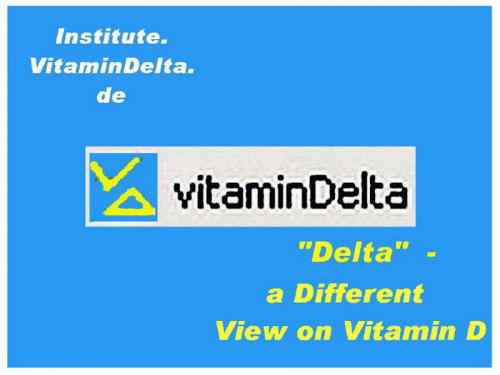 Vitamin-D-VitaminDelta-Institute
Vitamin-D-VitaminDelta-Institute
BACKGROUND:
The majority of the German population suffers from a vitamin D-deficiency. Reasons for this are an inadequate nutrition and a lack of sun exposure for an annual period of 6 months. However, pregnant women in particular are afraid that vitamin D might lead to malformations in the unborn child. The well known slogan is: “No tablets during pregnancy!” Up until now it has been difficult to rule out the possibility of malformations because double-blind studies with pregnant women are ethically objectionable. Scientific literature does not provide satisfactory answers to this difficult question either.
METHODS:
In 1967, Bärbel Karb conducted a vitamin D-experiment with 42 chickens in a simplified kind of “crossover design”. (pubmed.gov #5401066), (worldcat.org #4060930). This scientific work was reviewed.
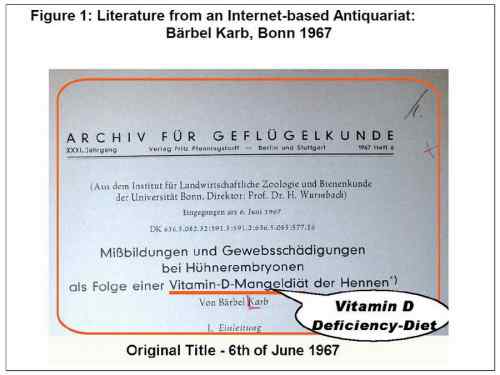 Vitamin-D-AntiTeratogen-02
Vitamin-D-AntiTeratogen-02
RESULTS:
Among the group of chickens with vitamin D-deficiency, 35% of the offspring showed malformations. In contrast, only 1.5% of the offspring of chickens with adequate vitamin D nutrition displayed malformations. When the chickens with vitamin D-deficiency were subsequently given vitamin D for 5 weeks, the rate of malformations was reduced to 6%. When the scientists stopped feeding vitamin D, the rate of malformations saw another increase to 35%.
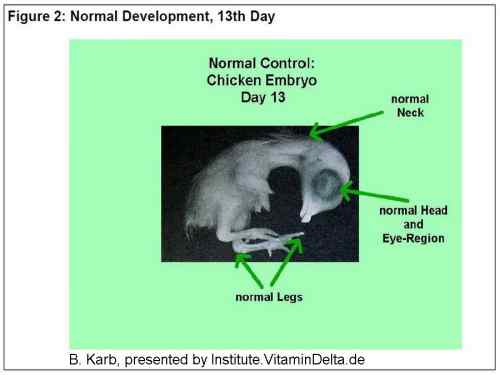 Vitamin-D-AntiTeratogen-03
Vitamin-D-AntiTeratogen-03
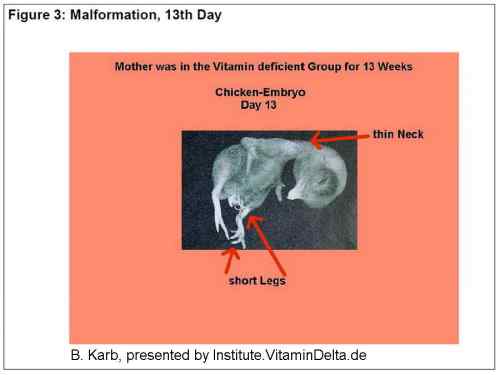 Vitamin-D-AntiTeratogen-04
Vitamin-D-AntiTeratogen-04
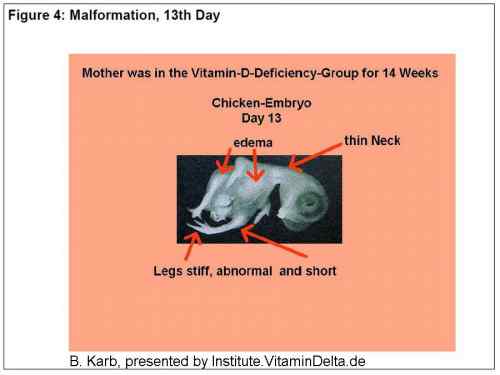 Vitamin-D-AntiTeratogen-05
Vitamin-D-AntiTeratogen-05
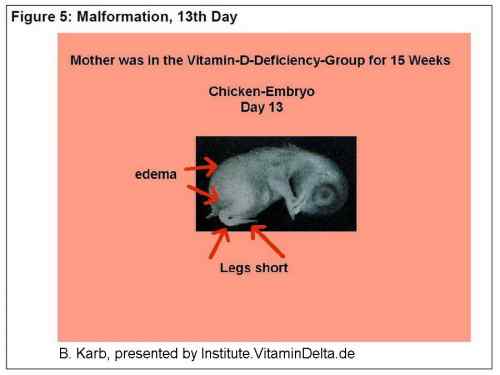 Vitamin-D-AntiTeratogen-06
Vitamin-D-AntiTeratogen-06
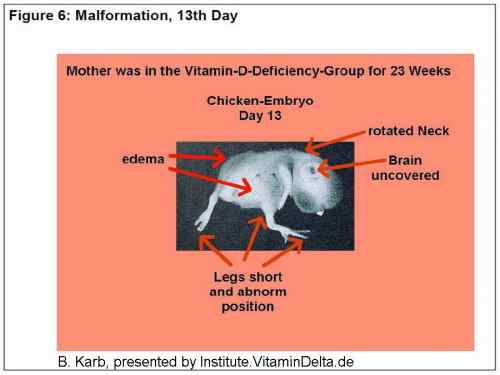 Vitamin-D-AntiTeratogen-03
Vitamin-D-AntiTeratogen-03
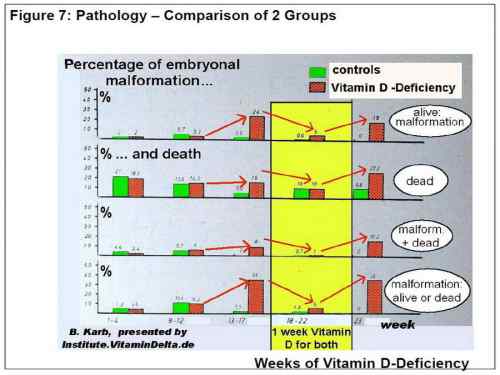 Vitamin-D-AntiTeratogen-04
Vitamin-D-AntiTeratogen-04
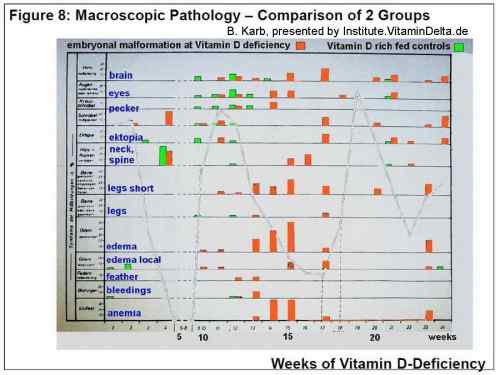 Vitamin-D-AntiTeratogen-05
Vitamin-D-AntiTeratogen-05
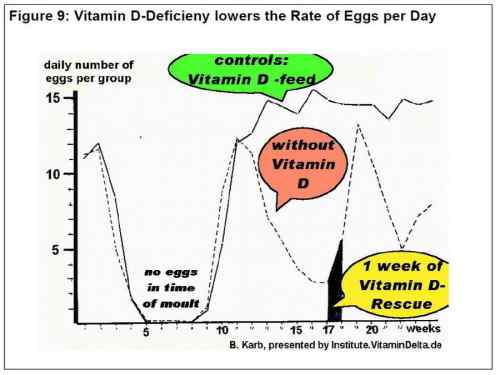 Vitamin-D-AntiTeratogen-06
Vitamin-D-AntiTeratogen-06
CONCLUSION:
Should women take vitamin D during pregnancy or not? This question is raised very often in a practitioner’s daily routine. A nutritional experiment from the year 1969 with chickens shows that malformations are induced by the deficiency of vitamin D.
The human risk of vitamin D-deficiency is common with overweight, smoking, anti-epileptic drugs and lack of sun exposure. These situations are calling for an adequate intake of Vitamin D. All pregnant women should be monitored for vitamin D-deficiency to prevent malformations of their children.















